All Management News
- Studying abroad at UC Berkeley February 17, 2022
Studying abroad is a dream for many. Studying abroad in reputed universities like the University of California, Berkeley is a golden opportunity. The Semester Abroad Programme at SRMAP gives wings to the aspirations of many who wish to gain educational experience abroad.
Mohammed Khizar Baig, a student of Computer Science Engineering, recently went to UC Berkeley through SRM University-AP’s Semester abroad Programme. Here’s what he has to say about his experience,
“It was a holistic selection process starting with an interview from SRM AP. Then the shortlisted candidates were invited for an interview from UC Berkeley. Apart from this, we were also required to submit a Statement of Purpose. Several factors including academics, extracurricular involvements, leadership background were considered for the evaluation.
The selection at the University of California, Berkeley was indeed ecstatic. A place where dreams are given the right guidance to turn into a reality. Situated right next to Silicon Valley, every aspiring entrepreneur’s dream destination, what could be a better experience than attending a university comprising staggering alumni of Nobel laureates, Olympic medallists, and legendary tech pioneers such as Steve Wozniak, Andrew Ng, Gordon E. Moore, and many more.
It is a semester-long program involving diverse courses from Entrepreneurship, Creative and Emerging Technologies, Design, and informative lecture series by eminent Founders and CEOs.
SRM AP extended its immense support throughout the selection process of UC Berkeley. Dr Naga Swetha ma’am helped in the interview and the shortlisting process along with establishing the connection with the team at UC Berkeley. I would also thank Dr Sonam Maurya ma’am for her immense support in the smooth Academic mapping process, which would make the transfer of credits easier once we are back to SRM AP. Dr Ashu Abdul sir and Dr T. Raghunathan sir also extended their guidance during the process.
As rightly said, “Dreams don’t work unless you do”, I aspire to assimilate the knowledge, experience, and most importantly the real-life lessons learned during my SAP at UC Berkeley and proliferate it to augment the entrepreneurial ecosystem back in India. This would be the most fundamental exposure pivotal in accomplishing my dream of establishing a start-up and eventually in manifesting my ambition of fostering a meaningful impact on humanity.”
SRM University-AP has enables the students to pursue their dream PhD at many prominent institutes along with UC Berkeley. Students are also provided with training and guidance for pursuing higher education abroad. Check out our International Relations page to learn more
If you would like to be a part of SRM University-AP’s vibrant and innovative culture of knowledge, ideas and research then see here what more we have on offer for you.
- Vision-based fall detection AI February 17, 2022
Human-like care is difficult to replicate. Due to the lack of a reliable vision-based fall detection AI, it is often more effective to assign a lot of manpower towards vision-based detections that have not been efficiently implemented.
Ms Inturi Anita Rani, Research Scholar in the Department of Computer Science Engineering, working with her supervisor, Dr V. M. Manikandan, has worked on a paper titled, “A Novel Vision-Based Fall Detection Scheme using Keypoints of Human-Skeleton with Long Short-term Memory Network” in the Arabian Journal for Science and Engineering published by Springer with an Impact Factor of 2.33.
Abstract of the research:
Humans are skilled at visually recognizing and classifying actions in videos, but it’s tough to automate this process. Human action detection in videos is useful in applications like automated surveillance, assisted living, human-computer interaction, content-based video retrieval, and video summarization. The ability to recognize atomic actions like “walking,” “bending,” and “falling” is critical for activity analysis when monitoring elderly people’s daily activities. Our paper presents a new promising solution for fall detection using vision-based approaches. In this approach, we analyse the human joint points which are the prime motion indicators. A set of keypoints of the subject are acquired by applying the AlphaPose pre-trained network. These keypoints are inferred to be the joint points of the subject. The acquired keypoints are processed through a framework of convolutional neural network (CNN) layers. Here, the spatial correlation of the keypoints is analysed. The long-term dependencies are then preserved with the help of long short-term memory (LSTM) architecture. Our system detects five types of falls and six types of daily living activities. We used the UP-FALL detection dataset for validating our fall detection system and achieved commendable results when compared to the state-of-the-art approaches. For comparison, we employed the OpenPose network for keypoint detection. It is inferred from the results that the AlphaPose network is more precise in keypoint detection.
About the research paper:
In this paper, the author proposes a vision-based system that is capable of detecting various types of falls accurately through video processing with the help of a machine learning approach.
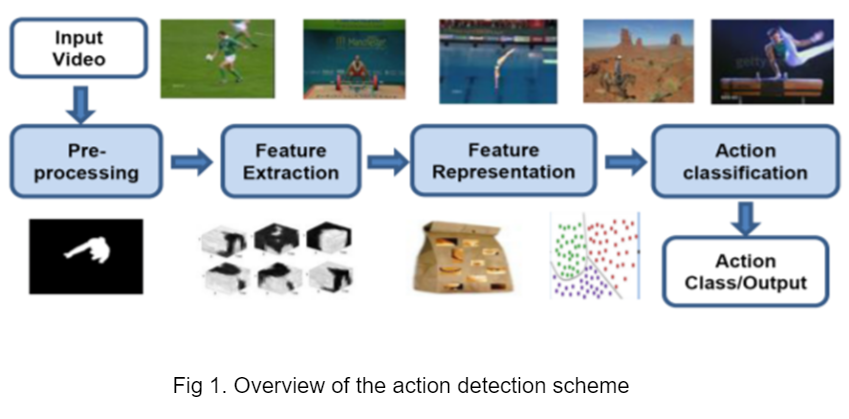
Implementation of the research:
The proposed scheme can be used to monitor the activity of elderly people and if any unusual falls happen, the information can be shared with caretakers to ensure emergency services.
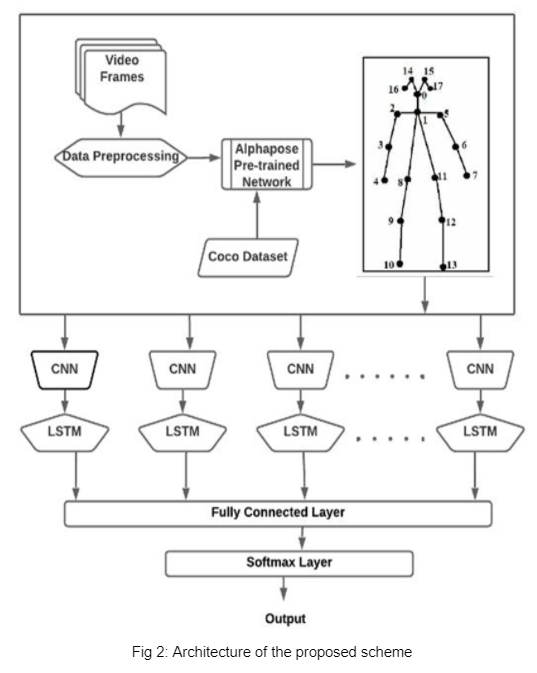
- Dr Meenakshi Choudhary February 16, 2022
- ECE at SRM AP – Opportunities and Career Prospects February 15, 2022
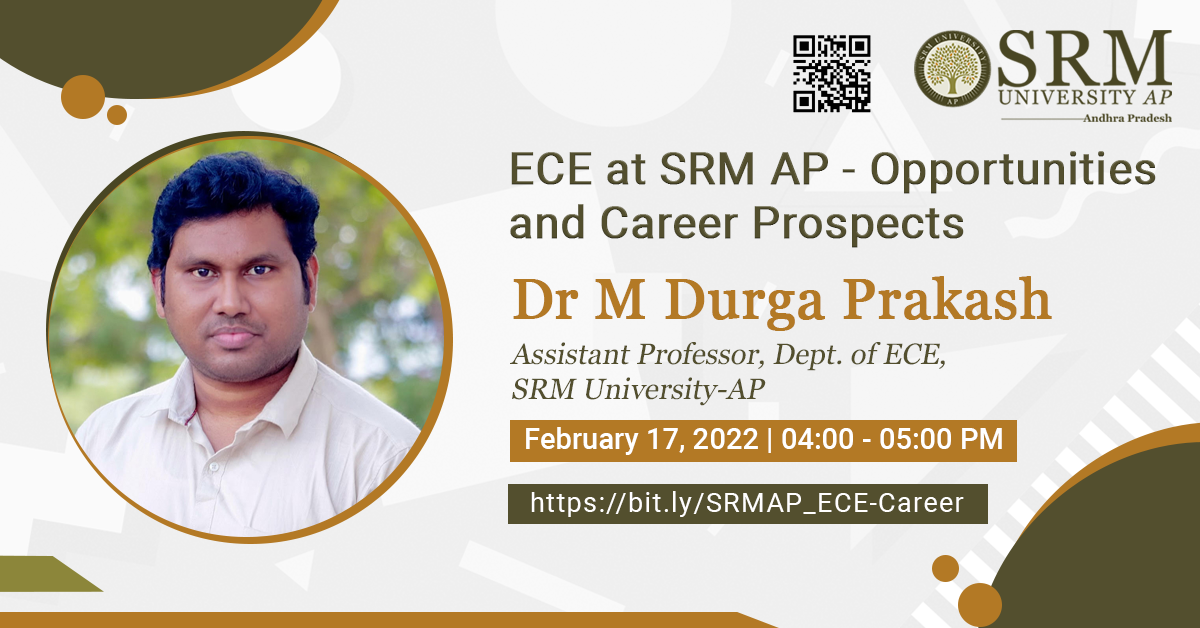 Electronics and Communications Engineering has many career prospects. Studying ECE at SRMAP will open the students to an array of opportunities in India and abroad. Students can learn from the industry experts and grow their expertise through the unique opportunities provided to them by our institution which include studying abroad opportunities, industrial collaborations, international internship opportunities and many more.
Electronics and Communications Engineering has many career prospects. Studying ECE at SRMAP will open the students to an array of opportunities in India and abroad. Students can learn from the industry experts and grow their expertise through the unique opportunities provided to them by our institution which include studying abroad opportunities, industrial collaborations, international internship opportunities and many more.Join the webinar on ECE at SRM AP- Opportunities and Career Prospects by Dr Durga Prakash, Assistant Professor, Department of ECE to learn more about the pathways that are open for the students who pursue BTech in Electronics and Communications Engineering.
Date: February 17, 2022
Time: 04.00 pm IST
About the Speaker:
Dr Durga Prakash is an Assistant Professor in the Department of Electronics and Communications Engineering. His key research interests lie in Microelectronics & VLSI, Semiconductor Device Modelling, Design & Simulations, Micro/Nano Fabricated Electrical Devices, and Biosensors and MEMS. He has over 15 years of professional experience.
Click here to join.
- Dr Manojkumar V February 14, 2022
- Reading Skills: Insights from a Historian February 14, 2022
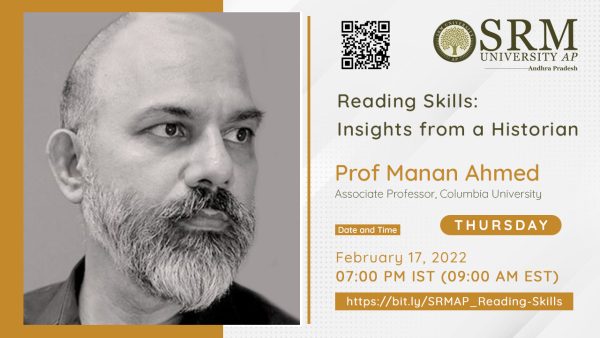 Reading means something different for everyone. Each person develops their reading skills as per their requirements. Some read to find information while others read to mine information. Some read to learn, and some read to laugh, some read to be entertained and some to escape. From reading the labels on new products to newspapers to novels, the objectives of reading can be plenty.
Reading means something different for everyone. Each person develops their reading skills as per their requirements. Some read to find information while others read to mine information. Some read to learn, and some read to laugh, some read to be entertained and some to escape. From reading the labels on new products to newspapers to novels, the objectives of reading can be plenty.The Department of English is bringing Prof Manan Ahmed – Associate Professor, Columbia University to shed light on the reading approach and the reading skills of a historian in an interesting and interactive session.
Date: February 17, 2022
Time: 07.00 pm IST
About the Speaker:
Manan Ahmed, Associate Professor of History at Columbia University in the City of New York, is a historian of South Asia and the littoral western Indian Ocean world from 1000-1800 CE. His areas of specialisation include intellectual history in South and Southeast Asia, critical philosophy of history, colonial and anti-colonial thought. Two of his books The Loss of Hindustan: The Invention of India (2020) and A Book of Conquest: The Chachnama and Muslim Origins in South Asia (2016) are published by Harvard University Press.
Abstract:
“Reading Skills” brings to mind dreadful reading comprehension passages given in schools and courses in communication skills. However, reading is much more about finding answers to given questions. It is about finding the questions to ask of a passage, blog, article, literary texts, and historical texts. In this talk and interaction, Prof Manan Ahmed would walk us through a historian’s approach to reading. The programme is intended to be a part of the department’s larger initiative to organise interactions around “Language and Society” to address all kinds of conversations about language, communication, writing, speaking, thinking, and at a deeper level, about connecting with others.
Click here to join this exclusive session and develop an insight on reading through the experiences of our esteemed speaker.
- SRM University-AP publishes as the lead author among 21 co-authors from 13 countries February 14, 2022
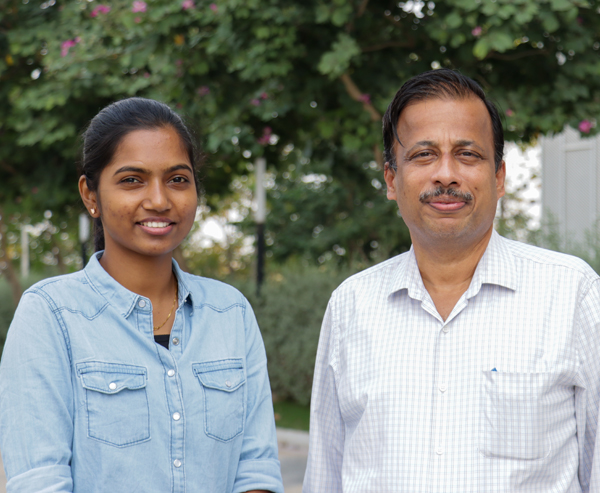 “Progress in Alternative Strategies to Combat Antimicrobial Resistance: Focus on Antibiotics” is a paper authored by Prof Jayaseelan Murugaiyan, Professor & Head, Department of Biological Sciences at SRM University-AP and his research scholar Ms Saranya Adukkadukkam, in Antibiotics Journal, having an impact factor of 4.639. It is a remarkable achievement that our university served as the first and the corresponding authors of this paper published in association with “Global AMR Insights Ambassadors Network”. A total of 21 co-authors from 13 countries (India, UK, France, The Netherlands, Switzerland, Italy, Spain, Ukraine, Lebanon, Egypt, Uganda, Bangladesh, and Nigeria) and six Indian universities (including SRM AP) participated in this work.
“Progress in Alternative Strategies to Combat Antimicrobial Resistance: Focus on Antibiotics” is a paper authored by Prof Jayaseelan Murugaiyan, Professor & Head, Department of Biological Sciences at SRM University-AP and his research scholar Ms Saranya Adukkadukkam, in Antibiotics Journal, having an impact factor of 4.639. It is a remarkable achievement that our university served as the first and the corresponding authors of this paper published in association with “Global AMR Insights Ambassadors Network”. A total of 21 co-authors from 13 countries (India, UK, France, The Netherlands, Switzerland, Italy, Spain, Ukraine, Lebanon, Egypt, Uganda, Bangladesh, and Nigeria) and six Indian universities (including SRM AP) participated in this work.Antimicrobial resistance (AMR) – the ability of microorganisms to survive antimicrobials – is a global healthcare concern. AMR contributes to 1.27 million deaths among the 4.95 million deaths associated with bacterial AMR. If no control measures are taken, it is estimated that by 2050, it will claim the lives of 300 million people. The rise of these “superbug bacteria’s” – means that trivial medical interventions will soon become once again high-risk since no efficient antimicrobial chemotherapy is available. It is, therefore, crucial to understand the current situation and identify alternatives to combat the emergence and spread of antimicrobial resistance. This paper comprehensively discusses the alternative approaches that can be effectively utilised to combat AMR and, at the same time, without inducing further resistance among the pathogens. The paper has great social implications in making society aware of the scenario and encouraging the researchers to focus on alternative strategies to combat AMR.
Abstract of the paper: Antibiotic resistance, and, in a broader perspective, antimicrobial resistance (AMR), continues to evolve and spread beyond all boundaries. As a result, infectious diseases have become more challenging or even impossible to treat, leading to an increase in morbidity and mortality. Despite the failure of conventional, traditional antimicrobial therapy, in the past two decades, no novel class of antibiotics has been introduced. Consequently, several novel alternative strategies to combat these (multi-) drug-resistant infectious microorganisms have been identified. The purpose of this review is to gather and consider the strategies that are being applied or proposed as potential alternatives to traditional antibiotics. These strategies include combination therapy, techniques that target the enzymes or proteins responsible for antimicrobial resistance, resistant bacteria, drug delivery systems, physicochemical methods, and unconventional techniques, including the CRISPR-Cas system. These alternative strategies may have the potential to change the treatment of multi-drug-resistant pathogens in human clinical settings.
Global AMR Insight Ambassador Network: AMR Insights, an international network-based organisation interacting with professionals around the globe: in Human and Veterinary Health, Agri-food and Environment, was set up in 2017 following an in-depth feasibility study towards a new information platform on AMR. It mainly focuses on informing, educating and connecting people with the aim to curb antimicrobial resistance. Prof Jayaseelan Murugaiyan and Ms Saranya Adukkadukkam are members of the Global AMR Insights Ambassador Network.
Ms Saranya Adukkadukkam, the co-author from SRM AP says:
The guidance of Prof Jayaseelan Murugaiyan is the pillar of my research. His support and passion for research always encourage me. He gives importance to translational research and motivates me to stand unique in the field. He shows me a path where I can serve the people through research. Foreseeing my future as a scientist, he guides me to more opportunities to collaborate with international scientists. I feel proud of my mentor Prof Jayaseelan Murugaiyan for letting me fly. Also, I thank SRM University-AP for providing generous fellowship, excellent research facilities and ambience to carry out the research.
- Budget Panel Discussion 2022-23 February 10, 2022
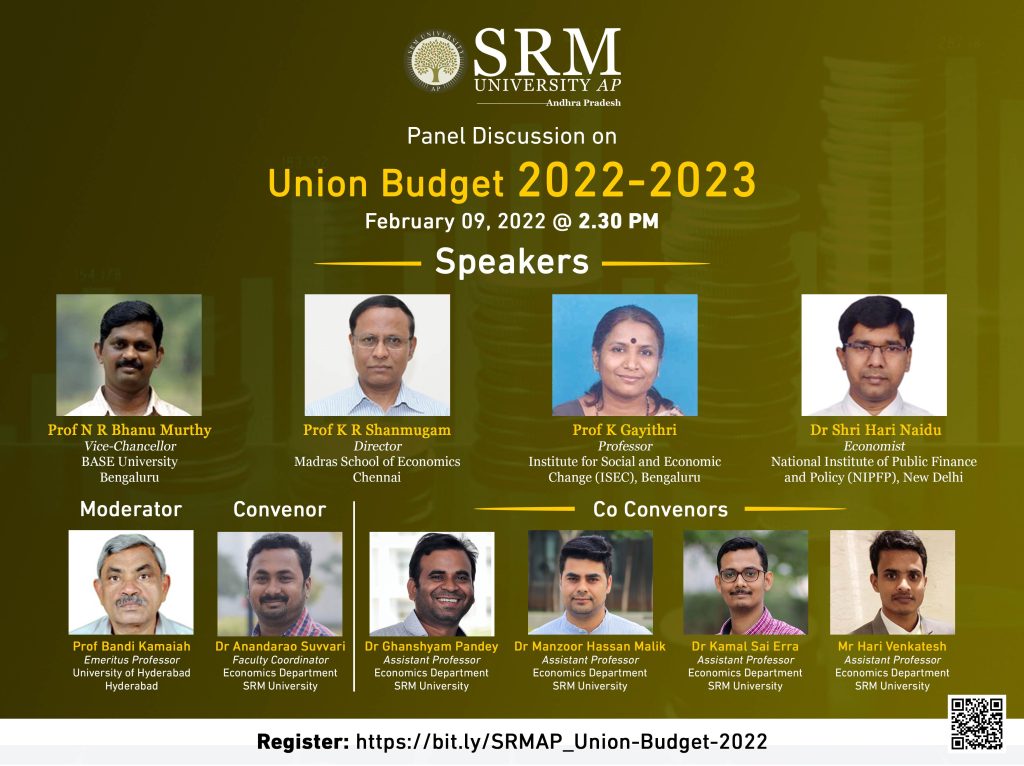 The Department of Economics of SRM University-AP, Andhra Pradesh, conducted a Panel Discussion on February 09, 2022, for the much needed and relevant in-depth analysis of the Union Budget proposed by the Finance Minister in the parliament on February 01, 2022.
The Department of Economics of SRM University-AP, Andhra Pradesh, conducted a Panel Discussion on February 09, 2022, for the much needed and relevant in-depth analysis of the Union Budget proposed by the Finance Minister in the parliament on February 01, 2022. Professor Bandi Kamaiah was the moderator of the event, and Dr Anandarao Suvvari, the faculty coordinator of the Department of Economics in the University, organised this discussion, inviting four eminent public finance economists of India, Prof N R Bhanu Murthy, Vice-Chancellor, BASE University, Bengaluru; Prof K R Shanmugam, Director, Madras School of Economics, Chennai; Prof K Gayathri, Professor, Institute for Social and Economic Change (ISEC), Bengaluru; Dr Shri Hari Naidu, Economist, National Institute of Public Finance and Policy (NIPFP), New Delhi. The co-convenors of the event were Dr Ghanshyam Pandey, Dr Manzoor Hassan Malik, Dr Kamal Sai Erra, Dr Hari Venkatesh from the Department of Economics SRM-AP.
The discussion started with a brief overview and essence of the Union budget by Dr Anandarao Suvvari, followed by Prof Bandi Kamaiah. Then first panellist Prof N R Bhanu Murthy, who our Indian Finance Minister also quoted, spoke about how the current budget is a continuation of the previous budget and emphasised more on the capital expenditure, which is the route to growth. He highlighted that the government should bring efficiency in public expenditure and expressed that the public policymakers side-lined the public debt number to GDP ratio at both central and state levels. An issue identified by Prof Murthy was bringing in many commodities under the customs tariff line and how doing this will have a negative impact on the exports. Further, he mentioned the ignorance towards the health and education sectors by a reduction in the allocation of expenditure for the same.
The second panellist Prof K R Shanmugam, gave a very detailed look at the budget, sector by sector, pointing out the benefits and the concerns related to each of them. He gave us a brief look at how the Indian economy has been doing for the past few years and gave an analysis taking this into consideration and stated that the budget had provided necessary fiscal stimuli through an increase in capital expenditure for the revival of the economy.
The third panellist Prof K Gayathri highlighted the philosophy of policy implications of budget and the need for a continuous process for analysing it. She also focused on the need for scientificity for estimates and the need for a sustainable approach for the budget. She pointed out that the current budget was future-looking in line with the vision for India 100 and that it put thorough emphasis on capacity building inclusive development by involving all stakeholders and modern infrastructure while expressing concern over effective implementation of policies.
The final panellist, Dr Shri Hari Naidu, discussed the revenue side of the budget thoroughly while focusing on the new taxation regime, other and legitimising crypto assets and digital Indian currency. In addition to this, Dr Naidu commented on the budget that the tax GDP ratio has been stagnant for the past two decades also, it has not been addressed in the budget, and despite the fact that there were a lot of tax reforms, the tax bases needed to be expanded.
After individual reviews by the panellists, questions posed by the students and the co-convenors were answered, followed by an interactive and engaging discussion among panellists, moderator, convenor and co-convenors on various issues spanning from the way of analysing the budget, trade-offs between debt and capital expenditure, debt sustainability, control mechanisms, the process of allocation, outcome evaluation or impact of the budget and the need for reality and effectiveness of planned budget on the ground level.
The session, after a thorough discussion on the union budget, was concluded by a vote of thanks proposed by Asst. Prof. Dr Hari Venkatesh to the esteemed panellists, moderator, convenor, co-convenors and all the people who made this session successful for contributing their precious time and valued efforts.
Continue reading → - Scope for ECE Students February 10, 2022
Electronics and Communications Engineering or ECE is a very popular educational choice for the prospective engineering students. ECE students can have careers in industries like consumer electronics manufacturing organization, Automotive, Telecommunication & IT industries, Health care equipment manufacturing, Mobile communication (2G, 3G, and 4G), Internet technologies, Power Electronics, and other industries like steel, petroleum, and chemical industry etc.
ECE students also have lots of opportunities in Government and private companies in the areas of design, manufacture, installation, operation, and maintenance of electronics equipment and systems. New opportunities and avenues are also opening for electronics & communication engineers due to the integration of electronics into various new industrial verticals.
The latest technologies include self-driving cars, autonomous drone logistics, robotics, automation in industries, smart energy systems etc. But getting acquainted with these industries will not be easy. They demand engineers who have more hands-on experience with the latest technologies.
Electronics students with skills in robotics, automation technologies, renewable energies, Internet of Things (IoT), mechatronics engineering concepts add more value to their average pay scale. Students pursuing electronics engineering aim to get a highly paid job, so improving their skill sets will impact their pay scale a lot.
Major technologies in which an ECE engineer can work on:
- Analog and Radio Frequency Circuits: Without these cell phones, Wi-Fi, television will cease to exist. A lot of industries are established to meet consumer demands, and, in the process, they opened a lot of job opportunities for electronics engineers.
- Communication & Signal Processing: This technology particularly finds its application in the transmission, storage, and analysis of information signals.
- Computer & Digital Systems: All the industries are able to advance technologically at a faster pace than before with the help of computers. These digital systems are everywhere from smartwatches to Mars rovers.
- Networking: With the boom on the internet, we are experiencing 3G, 4G services that help organizations and industries to easily collaborate with people. There is a lot of scope for engineers who want to work in this technology.
- Computer vision & Image processing: These technologies are helping computers in the areas like medical, surveying, photogrammetry etc. For instance, now we have medical devices that can analyse data to not only display images but identify diseases too with the help of magneto-resonance imaging technology
- Control systems & Robotics: With the advancement in technologies lately more and more industries are adopting automation and robots into their operations to improve their efficiency. And a lot more industries are expected to adopt these technologies in the coming years.
- Remote Sensing: Communication via radio waves is essential for mobile devices, radios, and all the devices that are connected to the internet. From mapping to navigation, remote sensing plays a vital role in various technologies.
- Nanotechnology: The more efficient solar cells, faster transistors, tracking chips and microscopic sensors that we see today are the products of nanotechnology. A lot of industries are adopting this technology to make their products smaller and more efficient.
- Sustainable Energy & Power systems: Now industries are investing lots of their money and time to develop more efficient solar cells, windmills, systems that can generate power from tides etc. This technology offers a wide range of job opportunities for electronics engineers.
- Energy Storage Technology: The demand for energy storage systems is likely to grow exponentially globally as the world shifts towards renewable energy sources. This shift will mandate both grid level and unit level energy storage systems that are of viable size, cost, and energy efficiency. Significant research is currently being conducted on materials, engineering, and other optimisations.
Skills that an ECE student needs to develop to improve job prospects:
If you are an ECE student, here are some of the skills and areas that you need to concentrate on to improve your job prospects:
- Computer proficiency is a must these days; try to get acquainted with some of the industrial-grade software.
- Develop your communication and interpersonal skills
- Develop more practical skills and get hands-on experience on theoretical concepts
- Get exposed to current industrial methodologies as much as possible
- Stay updated with the latest technologies by developing projects on them
- Do additional certified training programs to build your profile
- Take additional responsibilities in your college to showcase your managerial skills
- Develop your leadership and team working abilities
ECE at SRMAP:
Studying ECE at SRMAP offers students the unique opportunity to gain experiences, skills and knowledge which will set them apart from their peers.
- Semester Abroad Programme: For those who strive to learn cutting edge practices from reputed Universities abroad, SRMAP offers a dream-come-true opportunity to the selected students to obtain necessary skills and insights which will make them shine among their competitors.
- Centres of Excellence: The centres of excellence will nurture the potential in students by giving them a working environment and allowing them to test their mettle.
- Multidisciplinary curriculum: The curriculum at SRMAP is fluid. It draws upon traditional courses with a modern and practical outlook. However, the most prominent feature of the curriculum at SRMAP is that it transcends convention, focuses on recent trends in research and technology. and provides the students with the essential tools wot take the forefront positions in their field.
- Placements: Placements at SRMAP are extremely motivated by the individual’s needs and career aspirations. The students are given relevant advice since day one and often train to acquire skills as per their strengths and ambitions. This makes them the suitable candidate for their dream job with exciting offers in their hands.
- How to apply for May/Sept intake of foreign universities February 10, 2022
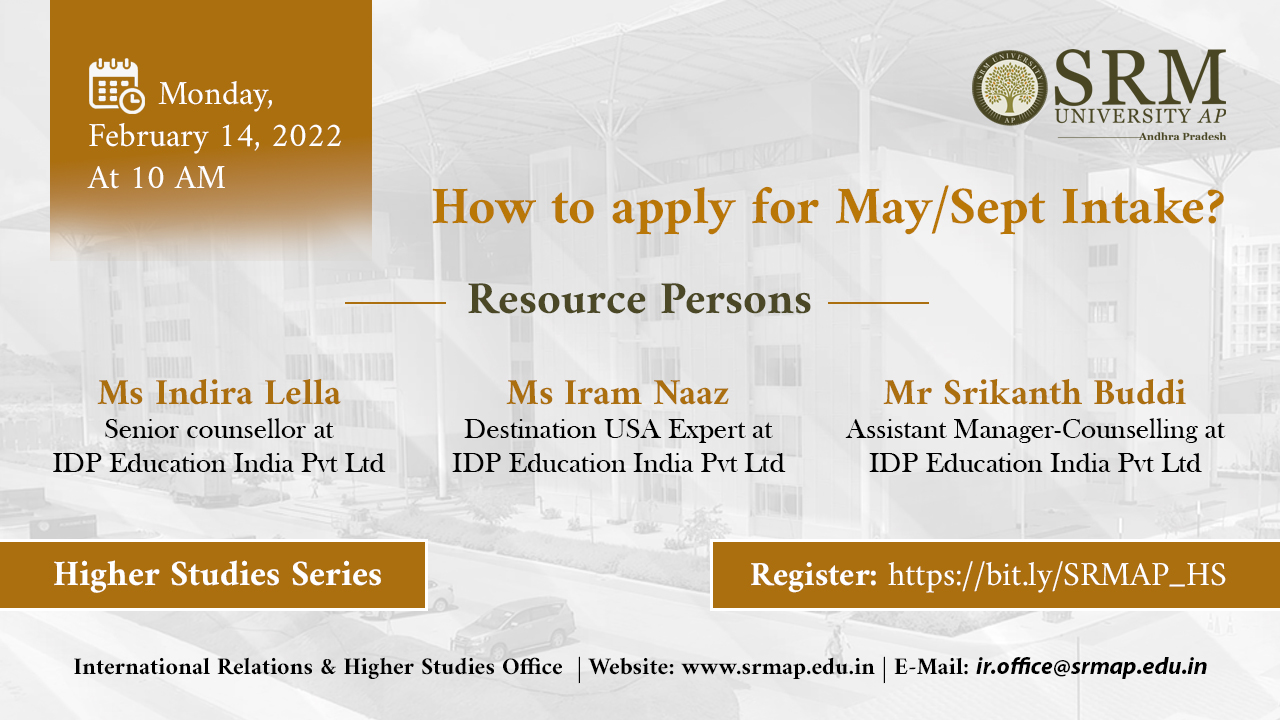 Understanding the application process for universities and colleges outside of India can be difficult because it differs significantly from those of Indian institutes.
Understanding the application process for universities and colleges outside of India can be difficult because it differs significantly from those of Indian institutes.The office of International Relations and Higher Studies at SRM University-AP is organising a session with international education experts as a part of the Higher Studies Series. Ms Lella Indira, Mr Srikanth Buddi and Ms Iram Naaz will enlighten the students on the topic “How to apply for May/Sept Intake?”.
It’s natural to be unsure about where to begin your application process. So, if you’re applying for the subsequent intakes, join this informative session on February 14, 2022, at 10.00 am.
Speakers’ Profile:
Lella Indira: She is a certified Canada destination expert with overall 6 yrs of Canada destination experience.
Srikanth Buddi: He is a certified destination expert with overall more than 6 yrs of UK destination expert. He has completed his masters in the UK and is currently working in the capacity of Assistant Manager-UK for four years.
Iram Naaz: She is a certified destination expert with overall 3 years of experience. She has been working as a USA Counselor for two years.
Continue reading →

